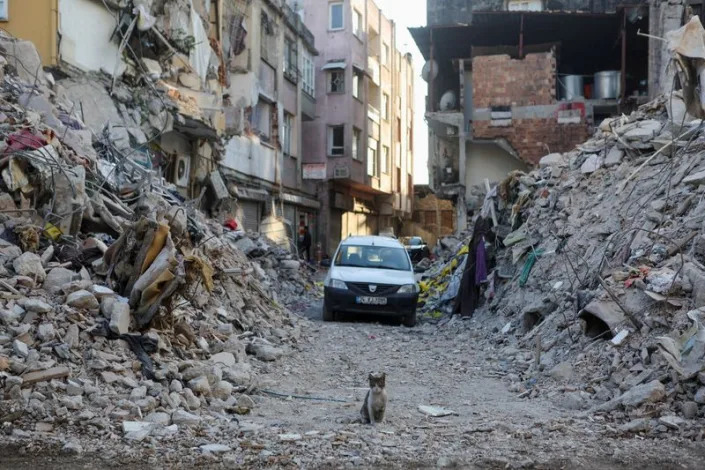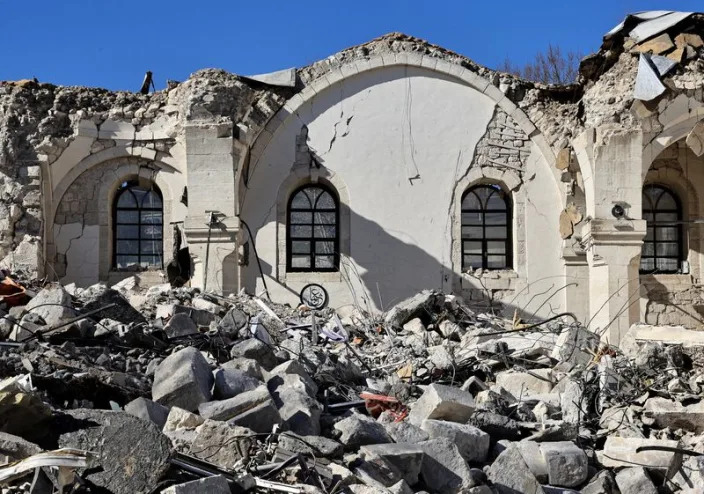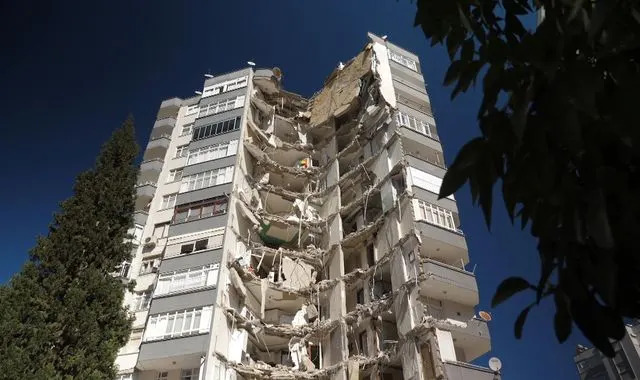

Aftermath of the deadly earthquake in Adiyaman
Fri, February 17, 2023
By Ali Kucukgocmen
HATAY, Turkey - Residents of a luxury housing complex in southern Turkey thought their apartments were 'earthquake-proof' until the structure toppled like a domino in last week's devastating earthquake, leaving hundreds feared dead.
Now the wreckage of the Ronesans Rezidans, which was advertised as "a piece of paradise" when it opened a decade ago, has become a focus of public anger.
Survivors stand by the pile of debris that was the 249-apartment block waiting for news of loved ones as hopes of their survival fade.
"My brother lived here for ten years... It was said to be earthquake safe, but you can see the result," said 47-year-old jeweller Hamza Alpaslan.
"It was introduced as the most beautiful residence in the world. It's in horrible condition. There is neither cement nor proper iron in it. It's a real hell," he added.
Eleven days after the quake that killed more than 43,000 in Turkey and Syria and left millions homeless, outrage is growing over what Turks see as corrupt building practices and deeply flawed urban developments.
Turkey's Urbanisation Ministry estimates 84,700 buildings have collapsed or are severely damaged.
While the Ronesans Rezidans, which translates as "Renaissance Residence", crumbled, several older buildings near the block still stood.
"We rented this place as an elite place, a safe place," said Sevil Karaabduloglu, whose two daughters are under the rubble.
Missing Ghanaian international footballer Christian Atsu who played for local team Hatayspor is also believed to have lived in the complex.
Dozens of people Reuters interviewed in the city of Hatay, where the complex stood, accused contractors of using cheap or unsuitable material and authorities of showing leniency towards sub-standard building constructions.
"Who is responsible? Everyone, everyone, everyone," said Alpaslan, blaming local authorities and building inspectors.
The developer of the complex, Mehmet Yasar Coskun, was arrested at Istanbul Airport as he prepared to board a plane for Montenegro last Friday evening, according to Turkish state news agency Anadolu.
"The public is looking for a criminal, a culprit. My client was picked as this culprit," Coskun's lawyer Kubra Kalkan Colakoglu told prosecutors, according to court documents seen by Anadolu, adding he denied any wrongdoing.
According to Anadolu, Coskun told prosecutors the building was solid and held all necessary licences.
ERDOGAN'S CONSTRUCTION BOOM
Turkey has vowed to probe the collapse of buildings and is investigating 246 suspects so far, including developers, 27 of whom are now in police detention.
"No rubble is cleared without collecting evidence," said Justice Minister Bekir Bozdag.
"Everyone who had a responsibility in constructing, inspecting, and using the buildings is being evaluated."
President Tayyip Erdogan's ruling AK Party has put great emphasis on construction, which has helped drive growth during its two decades in years in power, although the sector suffered in the last five years as the economy struggled.
Opposition parties accused his government of not enforcing building regulations, and of mis-spending special taxes levied after the last major earthquake in 1999 in order to make buildings more resistant to quakes.
In the 10 years to 2022, Turkey slipped 47 places in Transparency International's Corruption Perception Index to 101, having been as high as 54 out of 174 countries in 2012.
Erdogan claims the opposition tells lies to besmirch the government and obstruct investment.
Three kilometres away from the Renaissance Residence is a damaged state building connected to Turkey's Urbanisation Ministry and where locals and activists said vital documents relating to building safety and quality control were scattered among the debris.
Omer Mese, a lawyer from Istanbul, said he had been keeping watch over the rubble and is trying to save what could be vital evidence although some documents had been destroyed as people left homeless looked for anything they could burn for warmth.
"There were a lot of official documents with original signatures. It was essential to save and protect them... so that those responsible for this disaster can be brought to justice," he said, adding the papers included data on concrete and earthquake resistance tests.
"I read the news about contractors arrested after the earthquake but when we think about this destruction and its extent... there should be more," he added.
The Urbanisation Ministry said documents would be moved to the ministry archive in the city and were stored digitally.
BUILDING AMNESTY
Sector officials have said some 50% of the total 20 million buildings in Turkey contravene building codes.
In 2018 the government introduced a so-called zoning amnesty to legalise unregistered construction work, which engineers and architects warned could endanger lives.
Some 10 million people applied to benefit from the amnesty and 1.8 million applications were accepted. Property owners paid to register the buildings, which were then subject to various taxes and levies.
The government said it was needed to remove disagreements between the state and citizens and legalise structures.
"Unfortunately the zoning amnesty in our country is somehow
considered a public blessing," Mese said.
"We have become a society that lives by considering it a plus to put something off for a day, but we end up being crushed by the consequences of that. That is the problem."
(Writing by Alexandra Hudson; Editing by Jonathan Spicer and Christina Fincher)
Turkey earthquake: Anger grows over building standards in wake of deadly disaster
Fri, 17 February 2023

Treading carefully but quickly around her family home, Simge Ozdel is packing up her life.
She moves from room to room picking up urgent medicine for her diabetic father, as well as anything she can recover from her flat in Adana that was torn apart by the earthquake.
Simge was in her childhood bedroom when the tremors started.
"I realised the building was falling on top of me. Then I fled to the hallway and shut the door and when I did, the whole wall came down," she tells us.
The family has been told by inspectors the building will be reinforced and at some point, they can return.
But for now, the three of them will live in Istanbul.
Anger rising
With every day, public anger is intensifying. Turkish President Recep Tayyip Erdogan has struggled to defend his response to the earthquake.
Videos from a few years ago have emerged showing him praising one of the housing projects in Maras that crumbled, killing thousands of people.
On one, taken during a campaign stop ahead of Turkey's March 2019 elections, Mr Erdogan said: "We solved the problem of 144,156 citizens of Maras with zoning amnesty."
Critics say the amnesties, which forgave faults in millions of buildings and the lack of enforced safety measures likely contributed to the soaring death toll.
'We are always going backwards'
In Iskenderun, we meet Mustafa Onal who is loading up his motorbike with supplies. It is the first time he will step inside his flat since the earthquake.
He is scared of aftershocks and invites us to see his home. There are deep cracks on the inside and outside of the building.
Mustafa sees greed.
"In Turkey, there is no progress," he says.
"We're always going backwards. Architects, contractors, they're just looking at how they can steal, how they can gain."
Read more:
Before and after images highlight earthquake devastation
Syrian refugees fleeing back from Turkey after earthquake
President of Adana Chamber of Architects, Sedat Gul, meets us in the city, next to a building completely ripped apart by the earthquake. He is angry.
"There has been a void in the inspection process," he says.
"Local administrations like municipalities and contractors, void of any ethics, have cut corners and tried to make money.
"They've used loopholes in the law for their personal gain."
There were warnings about the infrastructure of the buildings not being up to standard.
Last year, the Turkish environment minister said 6.8 million homes in the country were considered risky and 1.5 million needed to be torn down urgently.
What is striking across the region are these buildings standing side-by-side that face completely different fates, one obliterated and the other completely intact.
There are lots of buildings like this with huge cracks in them and now they'll have to be inspected. If there is structural damage they'll have to be torn down.
A hellish landscape
In the port city of Iskenderun, Fatma is desperate to get back into her home.
She says her daughter and grandson are still in the burnt-out building.
"They're gone, they're gone," she cries. "I cannot breathe."
She is consoled by a relative who cradles her. It is a hellish landscape.
In those rare, still moments, this feels like a museum of mourning.
No one chose to visit of course, and yet so many will struggle to leave.
Fri, 17 February 2023

Treading carefully but quickly around her family home, Simge Ozdel is packing up her life.
She moves from room to room picking up urgent medicine for her diabetic father, as well as anything she can recover from her flat in Adana that was torn apart by the earthquake.
Simge was in her childhood bedroom when the tremors started.
"I realised the building was falling on top of me. Then I fled to the hallway and shut the door and when I did, the whole wall came down," she tells us.
The family has been told by inspectors the building will be reinforced and at some point, they can return.
But for now, the three of them will live in Istanbul.
Anger rising
With every day, public anger is intensifying. Turkish President Recep Tayyip Erdogan has struggled to defend his response to the earthquake.
Videos from a few years ago have emerged showing him praising one of the housing projects in Maras that crumbled, killing thousands of people.
On one, taken during a campaign stop ahead of Turkey's March 2019 elections, Mr Erdogan said: "We solved the problem of 144,156 citizens of Maras with zoning amnesty."
Critics say the amnesties, which forgave faults in millions of buildings and the lack of enforced safety measures likely contributed to the soaring death toll.
'We are always going backwards'
In Iskenderun, we meet Mustafa Onal who is loading up his motorbike with supplies. It is the first time he will step inside his flat since the earthquake.
He is scared of aftershocks and invites us to see his home. There are deep cracks on the inside and outside of the building.
Mustafa sees greed.
"In Turkey, there is no progress," he says.
"We're always going backwards. Architects, contractors, they're just looking at how they can steal, how they can gain."
Read more:
Before and after images highlight earthquake devastation
Syrian refugees fleeing back from Turkey after earthquake
President of Adana Chamber of Architects, Sedat Gul, meets us in the city, next to a building completely ripped apart by the earthquake. He is angry.
"There has been a void in the inspection process," he says.
"Local administrations like municipalities and contractors, void of any ethics, have cut corners and tried to make money.
"They've used loopholes in the law for their personal gain."
There were warnings about the infrastructure of the buildings not being up to standard.
Last year, the Turkish environment minister said 6.8 million homes in the country were considered risky and 1.5 million needed to be torn down urgently.
What is striking across the region are these buildings standing side-by-side that face completely different fates, one obliterated and the other completely intact.
There are lots of buildings like this with huge cracks in them and now they'll have to be inspected. If there is structural damage they'll have to be torn down.
A hellish landscape
In the port city of Iskenderun, Fatma is desperate to get back into her home.
She says her daughter and grandson are still in the burnt-out building.
"They're gone, they're gone," she cries. "I cannot breathe."
She is consoled by a relative who cradles her. It is a hellish landscape.
In those rare, still moments, this feels like a museum of mourning.
No one chose to visit of course, and yet so many will struggle to leave.
No comments:
Post a Comment